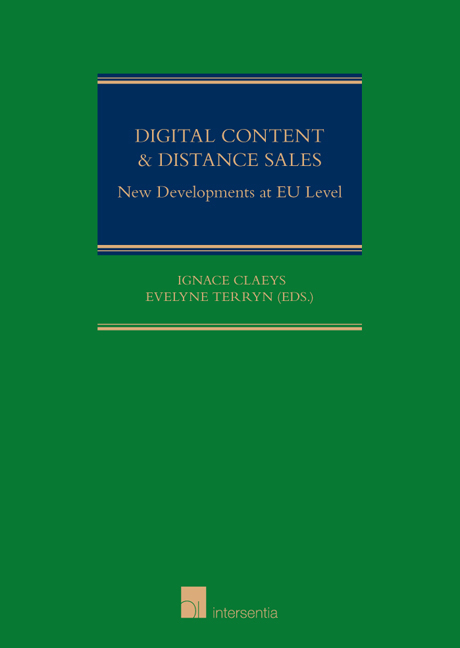Book contents
- Frontmatter
- Preface
- Contents
- List of Authors
- Part I Introduction
- Part II Proposals for a Directive on Online and Distance Sales of Tangible Goods and for a Directive on Digital Content
- Proposal for a Directive on Certain Aspects Concerning Contracts for the Online and Other Distance Sales of Goods: Scope of Application, Definitions and Conformity
- Proposal for a Directive on Digital Content: Scope of Application and Liability for a Lack of Conformity
- Remedies, Modification of Digital Content and Right to Terminate Long-Term Digital Content Contracts
- Commercial Guarantees in the Proposal for a Directive on Certain Aspects Concerning Contracts for the Online and Other Distance Sales of Goods
- Right of Redress
- Part III Proposal for a Regulation on Cross-Border Portability of Online Content Services in the Internal Market
- PART IV CONCLUSION
Proposal for a Directive on Digital Content: Scope of Application and Liability for a Lack of Conformity
from Part II - Proposals for a Directive on Online and Distance Sales of Tangible Goods and for a Directive on Digital Content
Published online by Cambridge University Press: 21 September 2018
- Frontmatter
- Preface
- Contents
- List of Authors
- Part I Introduction
- Part II Proposals for a Directive on Online and Distance Sales of Tangible Goods and for a Directive on Digital Content
- Proposal for a Directive on Certain Aspects Concerning Contracts for the Online and Other Distance Sales of Goods: Scope of Application, Definitions and Conformity
- Proposal for a Directive on Digital Content: Scope of Application and Liability for a Lack of Conformity
- Remedies, Modification of Digital Content and Right to Terminate Long-Term Digital Content Contracts
- Commercial Guarantees in the Proposal for a Directive on Certain Aspects Concerning Contracts for the Online and Other Distance Sales of Goods
- Right of Redress
- Part III Proposal for a Regulation on Cross-Border Portability of Online Content Services in the Internal Market
- PART IV CONCLUSION
Summary
INTRODUCTION
In December 2015, the European Commission proposed a Directive on certain aspects concerning contracts for the supply of digital content. The proposal is to be situated in the EU‘s strategy to create a digital single market and aims at stimulating the digital economy. To achieve this goal while ensuring a high level of consumer protection, harmonising part of the law on contracts for the supply of digital content is considered necessary.
SCOPE
As the title of the Proposal suggests, only some aspects of contracts for the supply of digital content are covered. According to its Article 1, the Proposal deals with (1) rules on the conformity of digital content with the contract, (2) remedies in case of lack of conformity and the modalities for the exercise of such remedies, and (3) rules on the modification of digital content and on the termination of long-term contracts. Although not explicitly mentioned in Article 1, the Proposal also determines when and to whom the digital content has to be supplied. At this point it should be mentioned that some other aspects were already fully harmonised by the 2011 Consumer Rights Directive. Examples thereof are the rules on pre-contractual information and the right to withdrawal. The Proposal is therefore said to supplement that Directive.
HARMONISATION LEVEL
EU consumer protecting directives can be based on either minimum or maximum (full) harmonisation. In case of minimum harmonisation, Member States retain the ability to adopt national provisions that offer a higher level of protection than the Directive. The only requirement thereof is that these additional protection measures are compatible with the principles of free movement of goods and services. In case of maximum or full harmonisation, Member States can neither introduce nor maintain measures that offer additional protection to consumers. The Directive then does not only determine the minimum of protection consumers are entitled to, but also the maximum of protection that can be offered.
The Proposal clearly pursues full harmonisation. It explicitly determines that Member States cannot maintain or introduce provisions diverging from those laid down in the proposed Directive. This precludes the enactment of both more stringent and more tolerant provisions.
- Type
- Chapter
- Information
- Digital Content and Distance SalesNew Developments at EU Level, pp. 95 - 166Publisher: IntersentiaPrint publication year: 2017
- 1
- Cited by



